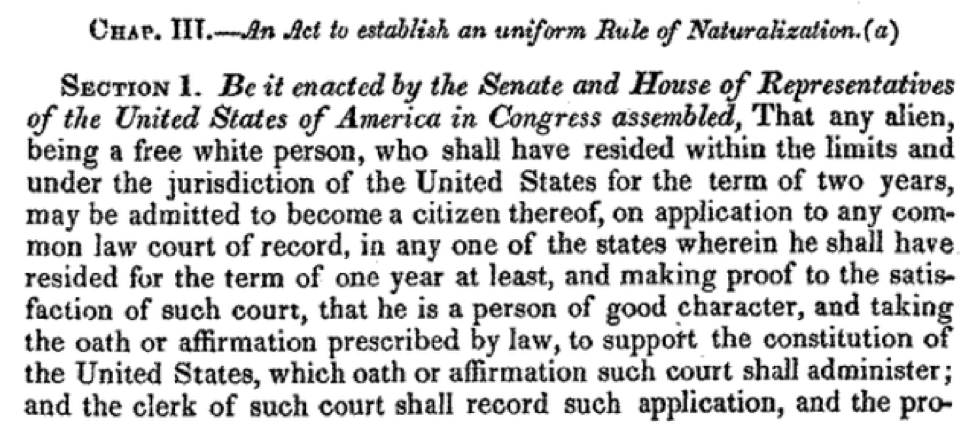
This was the first law to define eligibility for citizenship by naturalization and establish standards and procedures by which immigrants became US citizens. In this early version, Congress limited this important right to “free white persons.”
After Congress passed the Nationality Act of 1790, who could become a citizen through naturalization and what did eligible immigrants have to do to gain citizenship rights?
Who would have been excluded from citizenship through naturalization under the Nationality Act of 1790?
How might access or a lack of access to naturalization and citizenship rights have impacted different immigrant communities over time?
Congress first defined eligibility for citizenship by naturalization in this law, and limited this important right to “free white persons.” In practice, only white, male property owners could naturalize and acquire the status of citizens, whereas women, nonwhite persons, and indentured servants could not. Access to citizenship would become more expansive over time; although, the racial restriction was not eliminated entirely until 1952. This law produced the legal category of “aliens ineligible for citizenship” which largely affected Asian immigrants and limited their rights as noncitizens to key realms of life in the United States such as property ownership, representation in courts, public employment, and voting.
United States Congress, “An act to establish an uniform Rule of Naturalization” (March 26, 1790).
Be it enacted by the Senate and House of Representatives of the United States of America, in Congress assembled, That any Alien being a free white person, who shall have resided within the limits and under the jurisdiction of the United States for the term of two years, may be admitted to become a citizen thereof on application to any common law Court of record in any one of the States wherein he shall have resided for the term of one year at least, and making proof to the satisfaction of such Court that he is a person of good character, and taking the oath or affirmation prescribed by law to support the Constitution of the United States, which Oath or Affirmation such Court shall administer, and the Clerk of such Court shall record such Application, and the proceedings thereon; and thereupon such person shall be considered as a Citizen of the United States. And the children of such person so naturalized, dwelling within the United States, being under the age of twenty one years at the time of such naturalization, shall also be considered as citizens of the United States. And the children of citizens of the United States that may be born beyond Sea, or out of the limits of the United States, shall be considered as natural born Citizens: Provided, that the right of citizenship shall not descend to persons whose fathers have never been resident in the United States . . .
